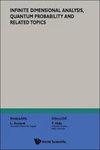On near-martingales and a class of anticipating linear stochastic differential equations
IF 0.8
4区 数学
Q4 MATHEMATICS, APPLIED
Infinite Dimensional Analysis Quantum Probability and Related Topics
Pub Date : 2023-12-16
DOI:10.1142/s0219025723500297
引用次数: 0
Abstract
The goals of this paper are to prove a near-martingale optional stopping theorem and establish solvability and large deviations for a class of anticipating linear stochastic differential equations. For a class of anticipating linear stochastic differential equations, we prove the existence and uniqueness of solutions using two approaches: (1) Ayed–Kuo differential formula using an ansatz, and (2) a braiding technique by interpreting the integral in the Skorokhod sense. We establish a Freidlin–Wentzell type large deviations result for the solution of such equations. In addition, we prove large deviation results for small noise where the initial conditions are random.
关于近马丁格尔和一类预期线性随机微分方程
本文的目标是证明近马勒可选停顿定理,并建立一类预期线性随机微分方程的可解性和大偏差。对于一类预期线性随机微分方程,我们用两种方法证明了解的存在性和唯一性:(1) Ayed-Kuo 微分公式,使用 ansatz;(2) 编织技术,在 Skorokhod 意义上解释积分。我们为此类方程的解建立了一个弗雷德林-温采尔型大偏差结果。此外,我们还证明了初始条件为随机的小噪声的大偏差结果。
本文章由计算机程序翻译,如有差异,请以英文原文为准。
求助全文
约1分钟内获得全文
求助全文
来源期刊
CiteScore
1.50
自引率
11.10%
发文量
34
审稿时长
>12 weeks
期刊介绍:
In the past few years the fields of infinite dimensional analysis and quantum probability have undergone increasingly significant developments and have found many new applications, in particular, to classical probability and to different branches of physics. The number of first-class papers in these fields has grown at the same rate. This is currently the only journal which is devoted to these fields.
It constitutes an essential and central point of reference for the large number of mathematicians, mathematical physicists and other scientists who have been drawn into these areas. Both fields have strong interdisciplinary nature, with deep connection to, for example, classical probability, stochastic analysis, mathematical physics, operator algebras, irreversibility, ergodic theory and dynamical systems, quantum groups, classical and quantum stochastic geometry, quantum chaos, Dirichlet forms, harmonic analysis, quantum measurement, quantum computer, etc. The journal reflects this interdisciplinarity and welcomes high quality papers in all such related fields, particularly those which reveal connections with the main fields of this journal.

 求助内容:
求助内容: 应助结果提醒方式:
应助结果提醒方式:


